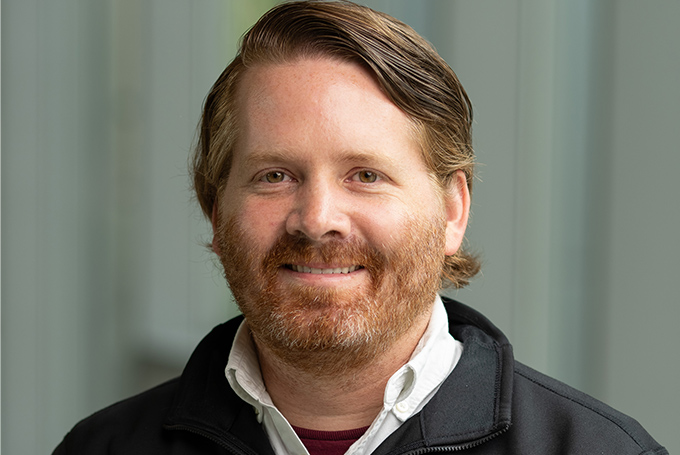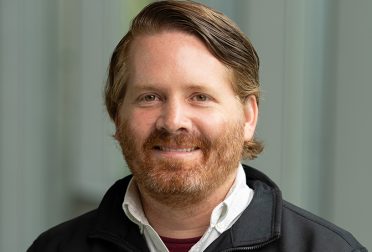Peter McCaffrey keeps himself busy. He cofounded the drug discovery startup Pragma Bio and served as CTO for seven years. During that time, he also worked in different roles in the University of Texas Medical Branch. Currently he’s the chief AI officer for the entire healthcare system. Now, Peter is joining the master’s program at MIT System Design and Management, and he sees the ways in which these two different paths can be served by the degree. “Some of the things you think about are the same. How do I articulate value? How do I measure what I’m doing? It’s two very different manifestations,” he says.
You have a background in medicine. How did you get into the startup and into AI?
I did a research fellowship overseas in Durban, South Africa, for a year during medical school. It was at an institution that’s now called AHRI or Africa Health Research Institute. We were building up processes, opening up our labs, setting up our equipment, building our very first infrastructure. I ended up being the bioinformatics and genomics guy even though I did not have that background at the time. I was captivated by the intellectual satisfaction of engineering, the click that you get out of building. I thought to myself, “I want to do whatever this is.” What in healthcare is tech-driven? And that led me to pathology. Pathology is a very tech-driven field. In a way, pathology only exists because of new technology—microscopes, new lab tests, genomics, etc.—and so that led me into pathology and further into pathology informatics, then further into informatics. It’s been more about where we can drive change through tech. And the growth and generality of AI has unavoidably made that an area of focus. It is so pervasive and so impactful.
How did you first hear about SDM?
I was looking for a program whose focus was on systems design. As I have grown more on this side of health system AI, I began to realize the complexity of a true multi-layered system with many stakeholders. And unlike a startup, which is challenging and complicated in its own ways, you don’t have regulators and finances and 15,000 people in the workforce. I did graduate training in AI at Stanford which was more about engineering. But I realized, this is a super complex system. I went looking for systems design and systems management programs. And obviously MIT is such a renowned epicenter for all things in the discipline of engineering and design. It just seemed wonderful. Who better to learn this from than this institution. This was exactly what I’m thinking of.
How are you hoping to apply a systems approach to your work?
It will bring a certain level of clarity and formality to how a problem is decomposed into the subsystems and pieces that make it the way it is. Understanding causality is really hard in healthcare. We often don’t really know what is actually a real problem, and why a real problem is important to solve. And I want to be consistent and good at strategy and communicate in that way. The clearer you are, the more people understand what you’re trying to address, and the easier they can be aligned with it and get on board. On the build-up side, you understand the problem. What are the various dimensions of your solution? The workflow, the people, the regulatory impact, the financial streams, the technology, how do they come together? Nothing that ever works can work without having to work in all of those ways.
What’s one thing you’re hoping to learn in the core class?
When I did my other schooling in AI/ML it did not really cover any sort of systems modeling or interaction-type modeling. It was much more about statistics and machine learning and building predictive tools, which is great. But I’m very excited to get the formal rigor of how to model a system, how to understand its behavior and how to understand its behavior in light of perturbation. I think that’s going to be key.
And I’m excited about the thesis component. Again, it’s so helpful to take a real thing you’re going to do and actually go do that thing, own that thing, run that thing, and have the rigor of having to account for it on all these levels of specificity. Challenges are good. That’s how we grow.
Are there particular elective courses that you’re really interested in?
I appreciated that a lot of the program was elective based. Taking advantage of this ecosystem could look different ways for different people. And that’s a soft signal that part of the value is self-directed learning and self-directed maturity. I was positively struck and engaged by that.
I’ve had to pick up financial modeling to some degree in the work world, but I’ve missed out on a formal understanding. Healthcare has core missions that aren’t even really aligned. We have to be a business and be profitable, but also do the right thing, whether or not it’s profitable. I’m looking forward to going much deeper on finance, financial modeling, and knowing how to talk the language of a CFO. And the second piece that I’ve never had formal training in is management. I’ve done some of it in the startup setting and in the work world here, but I’ve done enough to respect its difficulty and see it as an art unto itself. I’ve done just as many things poorly in management as I’ve done well and there’s opportunity to grow. People who are really good at management train at it like any disciplined skill set. I’m looking forward to having that as a skill I can grow and practice with discipline.
What’s something that you’re looking forward to about meeting your new classmates?
The team of us that founded Pragma Bio all met as co-fellows of the Texas Medical Center Biodesign program. That struck me as one of the biggest things you can do, not just for your own growth, but for your professional growth. If you want to put yourself in a high value environment, surround yourself with people who can do things you can’t do. I’m excited by the possibility to meet a lot of people to learn from and grow from, people who are hungry and interested in the same things. You might meet the next folks you do something together with, you might meet a lifelong friend, you might meet a business partner. A lot of the benefit of a community like MIT is meeting the other kinds of people who are there. In my experience, the relationships you walk away with often have the biggest impact.
What are you looking forward to most about being in Cambridge?
I was a resident in pathology at Massachusetts General Hospital and used to live on Beacon Hill for many years and loved it. It’s a place with lots of fond memories. My first son was born at MGH, my family and I lived in Beacon Hill, and I’m just excited to be back. There’s an energy to Boston and Cambridge you can’t replicate. People try. Nobody has yet succeeded. I’m looking forward to being back and re-experiencing the city after several years away.




